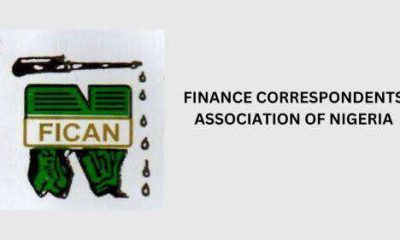Aviation
CBN intervention saves Nigeria $5bn loss to foreign airlines exit

By AYOOLA OLAOLUWA
Nigeria’s aviation industry and allied sectors like the hospitality and tourism sectors are facing imminent collapse as more foreign carriers are preparing to withdraw services over lingering challenge in repatriating their funds.
Although the Central Bank of Nigeria, CBN, at the weekend released $365 million to them, which is only about half of the claim put at $600 million, Domestic operators are kicking against what they see as discriminatory practice, while aviation experts believe, it will not solve the problem.
Airlines Operators of Nigeria, (AON) spokesman, Prof. Obiora Okonkwo, said last week, that the foreign airlines are arm twisting the government to give them what their own do not give other foreign airlines. He said that all the airlines domestic and foreign go through the same process – sourcing forex, buy JetA1, maintenance checks etc. so their case is not different.
According to him, the foreign airlines charge or cost their tickets at E&I window exchange rate, some even use parallel market rate, but when they want to repatriate their funds, the ask for CBN official rate which is exploitation. The E&I window is N438 per while official CBN rate is N416.
“Our government should not succumb to this blackmail, Nigerians passengers pay the highest amount on tickets in West Africa, because these airlines already factor in the differential in exchange rate, yet they want government to give official rate.
“A six hour flight from any Ghana costs N600,000 return, which cost almost N2 million in Nigeria. How can you explain? This is the many Nigerians now go to neighbouring countries to book their flight, thereby denying the country revenue.
“Even the BASA (Bilateral Air Services Agreement) they are talking about is based on equity and reciprocity. Emirates Airlines operate 21 slots into weekly, while AirPeace has only three slots; where is the equity.
“BA operates seven slots daily, while no Nigerian carrier goes to UK; again, where is the reciprocity and fairness?”, he told Arise television.
Nigeria, which gets about 90 per cent of its foreign exchange from the sale of crude oil, had been struggling with an economic downturn since 2015 when the sudden drop in crude oil price of mid-2014 stoked a severe dollar scarcity that depleted her foreign exchange reserve.
Despite crude oil prices hitting a record high of over $100 in 2022 as aftermath Russia’s invasion of Ukraine on February 24, the scarcity of dollars has refused to abate, as rising crude oil theft and subsidy on imported fuel continue to erode the gains recorded by rising crude prices.
One of the sectors affected by the scarcity is the aviation sector. In June, the International Air Transport Association (IATA) had appealed to the Federal Government to help unblock foreign carriers’ funds running into $450m (N188.6billion) as of June 2021.
The trapped funds, stakeholders in the aviation industry informed Business Hallmark, had since risen above the $600million mark as the nation and its economic managers grappled with the scarcity of foreign exchange.
Unable to repatriate the over $600million funds realised from ticket sales to their home countries, foreign airlines have been halting operations in Nigeria.
Some of the foreign airlines that have already announced their exit or cut down on flights to and from Nigeria include Emirates Airlines and British Airways.
On August 18, 2022, Emirates Airlines announced in a statement that its flight operations in Nigeria would be suspended from September 1, 2022 as a result of its inability to repatriate its funds.
“We have tried every avenue to address our ongoing challenges in repatriating funds from Nigeria, and we have made considerable efforts to initiate dialogue with the relevant authorities for their urgent intervention to help find a viable solution.
“Regrettably there has been no progress. Therefore, Emirates has taken the difficult decision to suspend all flights to and from Nigeria, effective September 1, 2022, to limit further losses and impact on our operational costs that continue to accumulate in the market.
“We sincerely regret the inconvenience caused to our customers, however the circumstances are beyond our control at this stage. We will be working to help impacted customers make alternative travel arrangements wherever possible,” the airline stated.
Barely two hours after Emirates announcement, British Airways followed suit with the announcement that it was reducing its flight frequencies to Nigeria. The airline also informed its customers of a rise in the cost of its flight tickets.
“Good afternoon. Please be informed that BA is changing to full fares F, J, W and Y seats any moment from now. Kindly let us issue any pending tickets to avoid fare increase,” the airline advised
BH reliably gathered that other airlines, such as Air France-KLM, Virgin Atlantic, Lufthansa, Swiss Air, United and Delta Airlines are also considering suspending their operations in Nigeria until the situation improves.
Speaking on the matter, the President of the Association of Foreign Airlines and Representatives in Nigeria, Kingsley Nwokeoma, said more international carriers would join Emirates Airlines soon if nothing is done to address the situation.
“This is just the beginning. The amount is over $1billion, not even the $600million widely reported that is being held and they (foreign airlines) cannot repatriate it.
“If other countries are like Nigeria, there will not be any industry because this money is used for maintenance. Even the money used to pay their staff in Nigeria is coming from other climes.
“The aviation industry is all about 100 per cent safety. If there is no money, safety will not be 100 per cent guaranteed. So, it is going to continue.
“Emirates has kick-started it and I’m sure that you are aware that British Airways has cut flights into Nigeria and that is how it is going to start.
“Just like Emirates did, they will first of all cut their flight into Nigeria and they will look at it holistically again and if it is not working out, then it’s not working out.
“This did not start today. It started over the years and the government is not doing anything,” Nwokeoma stated.
Meanwhile, the nation is set to lose revenue running into several billions of dollars in the event that the airlines fulfilled their threats.
According to multiple sources, the withdrawal of services by foreign airlines may cost the nation well over $5billion.
For instance, projected loses from the aviation sector alone will set the nation back by about $1.36 billion or N567.12 billion (at the official rate of $/N417) annually.
According to IATA’s estimate, Nigeria’s aviation industry earned a total of $1.7 billion in 2020, out of which $1.34billion (80%) came from the foreign carriers flying Nigerian routes.
The revenues, it was learnt, were gotten from sundry operational charges and taxes remitted to the government in hard currencies.
“Losses from foreign airlines’ withdrawal will be huge. The $1.34billion revenue mentioned earlier is just a fraction of what they (airlines) bring to the table.
“For instance, the airlines also contribute to the growth of the petroleum sector as their jumbo jets operate on aviation fuel which local marketers supply.
“Emirates Airlines, before the announcement of flights stoppage to and from Nigeria, operates daily flight schedule of 21 trips to the Murtala Muhammed International Airport, Lagos (14 flights) and the Nnamdi Azikiwe International Airport, (seven), Abuja (seven) from Abu Dhabi, Dubai and 12 African countries, using its Airbus A380-800, Boeing 777-200LR Boeing 777-300ER aircraft.
“While the A380-800 series are able to carry up to 320,000 litres (84,535 gallons), almost ten 33,000 litres fuel tankers, the Boeing 777 series are able to carry up to 181,300 litres (47,890 gallons), about six 30,000 litres fuel tankers.
“You can imagine what enters the pockets of fuel marketers, even if the margin is just N1 on each litre, and assuming the planes take into the sky with half tanks.
“This is just one airline for crying out load. And we have not added the 5% fuel surcharge collected on behalf of the Federal Government by the Nigeria Civil Aviation Authority (NCAA).
“If you put all these together, you will see that the government will be foolish to allow the airlines to withdraw or scale down their services as already announced”, admonished a top union executive in one of the airlines.
The losses, BH gathered, will not be limited to the aviation sector and petroleum, as all other allied businesses, such as hotels and tourism, travel agencies, tour guides, car rentals, ground handling services, and catering services, among many others will suffer.
Industry stakeholders, who spoke to our correspondent revealed that hotels, particularly top brands like Sheraton, Transcorp Hilton, Eko Hotels and Suites, Radisson Blu and Marriot Hotels will be badly hit as their rooms will operate below capacity as a large percentage of foreign guests who normally patronise them won’t be able to find their ways to the country as local airlines do not have the capacity to fill the gap to be created by the foreign airlines’.
Hotels are also going to be affected by the absence of the crew and staff of foreign airlines, as well as passengers of the airlines whose flights are delayed that are normally lodged in the facilities.
“The overall effect on the nation’s economy would be colossal. Is it the revenue from the food and drinks that these trapped guests will consume while in the country that we should talk about, or the foreign exchange they are expected to bring into the country?
“During the COVID-19 lockdown, our car hire service arm was severely affected as our drivers and tours guides were idle with nothing to do.
“We had to place them on half salaries. I pray we won’t ever come to that junction again.
“I appeal to all parties involved to do the needful by making sure that the impasse is amicably resolved”, admonished Mr. Michael Darling, the Managing Director of Tours and Travels, a travel agency based in Ikeja, Lagos.
Speaking on the development, former Commandant of the Lagos Airport, Group Captain John Ojikutu (retd), said unless the government pulls the industry back from the brink, the outlook appears dreadful.
“We are going to be the loser if the foreign airlines withdraw their flights to our country because about 70 to 80 per cent of our earnings in commercial aviation is from the foreign airlines.
“What will happen is that we will see Nigerians going to Accra, Cotonou, Lome, and so on, to connect the flights of these foreign airlines making them hubs over Nigeria.
“I saw this happening to us when a minister unilaterally cut off the commercial agreements between us and the airlines and when we indirectly opened the domestic routes and markets to multiple destinations. The consequences are staring at us all. Now, who will save us from ourselves?”
He advised that all stakeholders should avoid the blame game and come together as one to address the problem.
“Otherwise, we, particularly our aviation industry, are on the way to the valley of the shadow of death. First, why do we find ourselves among the countries that are not keeping to the articles of the Bilateral Air Service Agreements (BASAs)?
“Secondly, what happens to our forex earnings on commercial aviation, particularly those earned by the aviation services providers like the Passenger Service Charge (PSC) of $100/passenger and those earned on landing and parking?
“What about the forex earnings by others like the ground handling services companies such as NAHCO Plc, SAHCO Plc and the fuel marketers?
“My last calculation on all these is over $1 billion. But where are they before we start blaming the CBN that cannot account for the forex earnings and deposits from NNPC, NPA, NIMASA and so on?
“Any agency collecting forex must account for it, deposit it at the CBN and collect naira equivalence. That, I believe, is the law because we don’t spend dollars and our budgets are in naira. That is what I reasoned out of Obasanjo’s directive to the government aviation agencies in 2006,” Ojikutu said.
Meanwhile, in a bold move to resolve the logjam, the Central Bank of Nigeria (CBN) on Friday announced the release of $265m out of the trapped funds to the foreign carriers.
A breakdown of the figure shows that $230m was released as a special FX intervention while the remaining $35m was released through the Retail SMIS auction.
Confirming the release, the Director, Corporate Communications Department at the CBN, Mr. Osita Nwanisobi, said the CBN governor and his team were concerned about the development and what it portends for the sector and travelers as well as the country in the comity of nations.
Nwanisobi reiterated that the apex bank was not against any company repatriating its funds from the country, adding that what the CBN stood for was an orderly exit for those that might be interested in doing so.









